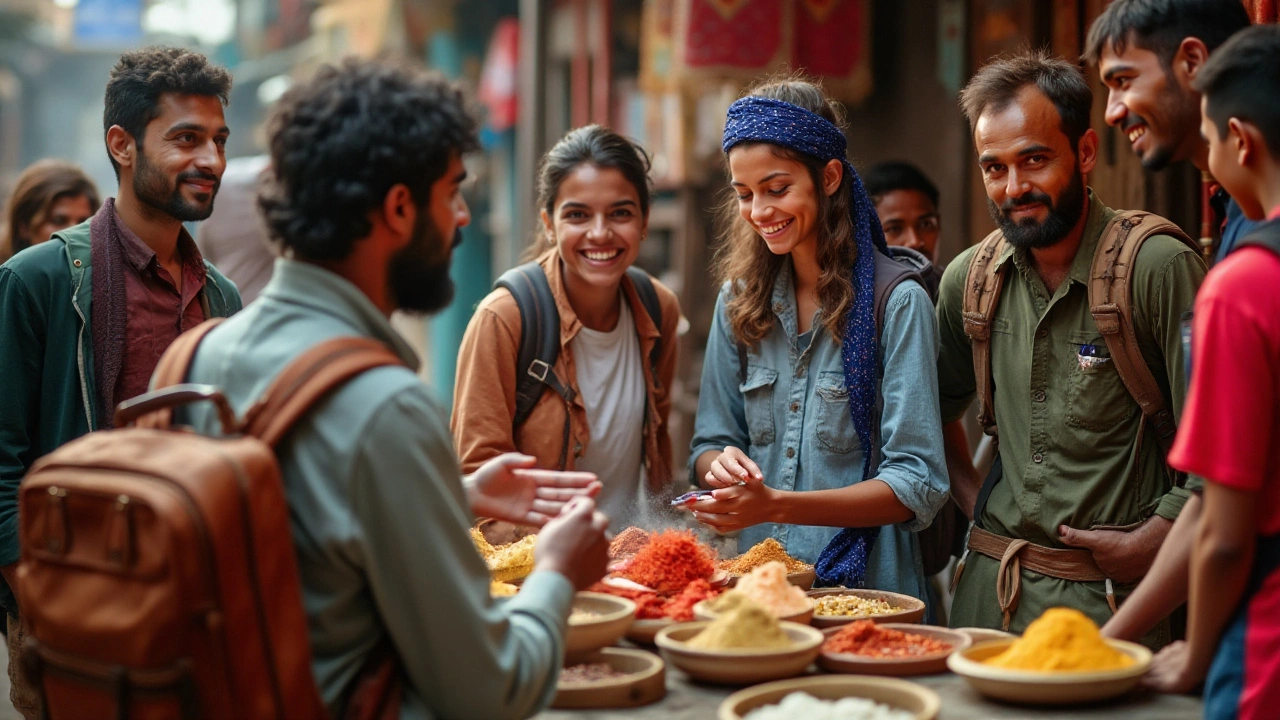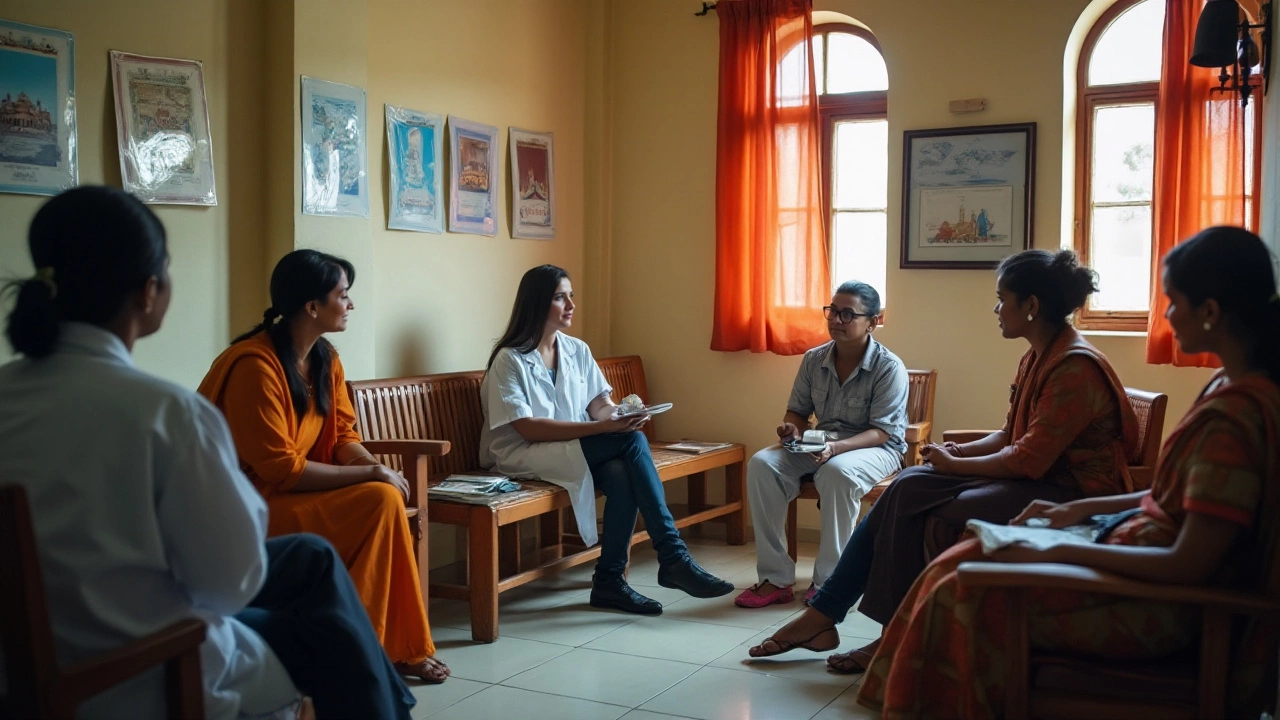Essential Vaccinations for Travel to India: A Guide for Budget Travelers
 Jan, 6 2025
Jan, 6 2025
Traveling to India is a thrilling adventure filled with vibrant cultures, breathtaking landscapes, and unforgettable experiences. However, to make the most of your journey, good health is paramount. Knowing what vaccinations you need before setting foot in this vibrant country can make a world of difference.
India is a land of myriad wonders, but it also presents certain health challenges that travelers should prepare for. Understanding these risks and getting the right vaccinations can ensure you stay healthy throughout your trip. In this article, we'll explore the essential vaccinations recommended for travelers to India. From staying ahead of common illnesses to managing vaccination costs on a budget, we aim to equip you with practical tips so you can focus on the adventure that awaits.
- Understanding Health Risks in India
- Key Vaccinations for Travelers
- Consulting with Healthcare Professionals
- Cost-Effective Vaccination Strategies
- Maintaining Health During Your Trip
Understanding Health Risks in India
India, a vast and diverse country, offers an amazing tapestry of cultural and natural attractions that lure countless travelers from across the world. Yet, like every destination, it comes with its own set of health risks. Navigating these risks ahead of your trip can make your journey both safer and more enjoyable. India's climate varies immensely, introducing different health risks depending on the region and season you visit. The monsoon season, for instance, often exacerbates the risk of mosquito-borne diseases like malaria and dengue fever. These conditions can be serious if not properly managed, making it crucial to source preventive measures before traveling.
Waterborne and foodborne illnesses form another significant concern. While India boasts a delectable culinary scene, travelers should exercise caution. Street food and untreated water might carry pathogens leading to conditions such as travelers' diarrhea, cholera, or typhoid fever. Stick to bottled water and be mindful of hygiene standards when sampling local dishes. Not only will this protect your health, but it also ensures you enjoy India’s flavors without concern.
Rabies, though rare in developed areas, is a risk due to the large population of stray animals. Despite their charming presence, avoid unnecessary contact with animals to prevent potential exposure. Vaccinating against rabies might be necessary for those venturing into rural areas or planning longer stays.
One cannot overlook air quality, especially in bustling urban centers. Cities like Delhi and Mumbai often grapple with pollution levels that can affect those with respiratory issues. Wearing masks and staying indoors on days with poor air quality can mitigate these risks efficiently. This information is critical for travelers with asthma or other chronic respiratory conditions. Highlighting these varied health risks emphasizes the importance of staying informed and preparing appropriately for a visit to India.
According to the World Health Organization, “Travelers should be encouraged to know their destination’s local health risks and take appropriate measures to prevent illness.” This advice extends to all aspiring to explore India’s wonders.
Therefore, it is helpful to consult with a healthcare professional who is well-versed in travel medicine before your trip. By understanding these potential health challenges, travelers can take informed steps to preserve their wellbeing and savor all the beauty and culture India has to offer.
Key Vaccinations for Travelers
When preparing for a trip to India, especially for those traveling on a budget, understanding the necessary vaccinations plays a crucial role in safeguarding your health. India, with its rich tapestry of culture and tradition, also presents certain health concerns that travelers should be mindful of. The first vaccine on your list should be for Hepatitis A, a common illness spread through contaminated food and water. Since many travelers explore India's bustling streets and indulge in its delectable street food, this vaccine is highly recommended. Most vaccinations for India require a course that starts a few weeks before departure, so it's wise to plan accordingly.
Another important vaccination is Hepatitis B, particularly if you plan to stay for a more extended period or have direct contact with locals, including medical care. The disease is transmitted through blood and bodily fluids and can also be contracted through unprotected medical treatments. Typhoid fever is another risk, especially if your journey involves areas with questionable sanitation. This vaccination is often neglected by travelers but can be crucial if you enjoy exploring off-the-beaten-path destinations, especially in rural regions.
Travels to certain parts of India might also necessitate the Japanese Encephalitis vaccine. While not required for all travelers, it's essential for those venturing to rural farming areas, particularly during the monsoon season when mosquitoes are prevalent. Rabies vaccinations should be considered as well. While rabid animal encounters are rare, the abundance of stray animals in both urban and rural areas elevates the risk slightly. A pre-exposure rabies vaccination provides a layer of security against this potentially fatal disease.
Polio Booster and Other Considerations
Additionally, amid the resurgence of Polio in some parts of Asia, it's prudent to consider a Polio booster before travel. Although India was declared Polio-free in 2014, staying informed of current health advisories is always beneficial. The Centers for Disease Control and Prevention (CDC) often update their travel health notices, providing current data on disease outbreaks and recommendations for travelers.
Many travelers overlook the importance of a Tetanus vaccine, which is essential for any adventure involving the outdoors. Tetanus can be contracted from cuts or wounds and keeping this vaccination up to date should be on your checklist too.
According to Dr. Martin Andrews from the World Health Organization, 'Vaccination remains one of the key elements in any travel health preparation. It's essential not just for personal protection, but as part of a collective effort to maintain public health on a global scale.'In today's interconnected world, staying vaccine-aware is part of being a responsible traveler.
Finally, before setting off, ensure your basic vaccines such as Measles, Mumps, and Rubella (MMR) are current. While these diseases are uncommon, outbreaks can and do occur, especially in regions with lower vaccination coverage. The key to a healthy and enjoyable visit is preparation, allowing you to immerse yourself fully in India’s enriching experiences without the worry of falling ill from preventable diseases.

Consulting with Healthcare Professionals
Embarking on a journey to India ought to begin with a thoughtful consultation with healthcare professionals. Before diving into the bustling streets of Delhi or the placid backwaters of Kerala, it’s crucial to understand which vaccinations are pivotal for your well-being. When you consult a healthcare provider, particularly a travel medicine specialist, they can offer personalized advice based on your medical history, current health status, and the specific regions in India you plan to visit. A competent healthcare professional prioritizes your health amid the excitement of travel. They can also forecast potential health risks based on latest travel health advisories specific to India.
One of the fundamental reasons for this consultation is the country's diverse climatic zones and local health threats. In some regions, the risk of exposure to diseases like malaria or typhoid might be higher than in others. A healthcare specialist will consider local conditions and provide a tailored list of precautionary measures and vaccinations for India. In many cases, vaccinations are not just about self-protection but also about safeguarding local communities where you travel. For instance, Japan rabies-free status became a landmark health achievement partly due to vaccination awareness among travelers. This signifies how travel health protection extends beyond personal well-being.
During the consultation, you'll learn about essential vaccinations such as Hepatitis A and B, typhoid, and possibly the rabies vaccine, depending on your itinerary. Another essential vaccine to consider is the one for Japanese Encephalitis, especially if you're visiting rural or agriculture-intensive areas. While cholera vaccination is often only recommended for travelers at high risk, your specialist might suggest it if you plan extensive travel during monsoon seasons. Recent WHO studies have even shown that vaccination compliance among travelers increases when there are face-to-face consultations.
According to the CDC, "Consulting with a travel medicine doctor 4 to 6 weeks before traveling can not only reduce and manage health-related issues effectively but also improve a traveler's awareness about the host destination."
The financial aspect is another layer of the conversation with healthcare professionals. They can guide you to cost-effective vaccination strategies, perhaps through public health services or travel clinics that offer vaccinations at subsidized rates. If you already hold medical insurance, it’s beneficial to ask whether these costs are covered. For any traveler on a budget, this aspect can significantly impact your overall travel expense. In some instances, clinics have arrangements for travelers needing multiple vaccines, providing packages at discounted rates.
Ultimately, this consultative phase of pre-travel preparation ensures that your health takes precedence without weighing too heavily on your travel budget. It lays the groundwork for a journey that prioritizes safety and enrichment, characterized by informed choices and preemptive measures. Beyond vaccinations, healthcare professionals can recommend preparing a travel kit with essentials like antimalarial pills or motion sickness medication, tailored to India's unique challenges.
Cost-Effective Vaccination Strategies
When planning a budget trip to India, the cost of vaccinations can be a significant consideration. Many travelers are concerned about the expenses involved in staying healthy while exploring the wonders of India. But fear not, there are several strategies you can employ to keep these costs manageable without skimping on essential health precautions. One of the first steps to consider is scheduling your vaccinations well in advance. This allows you to spread the cost over a longer period rather than taking a financial hit right before your departure. Timing is crucial because some vaccines require multiple doses over weeks or months.
Another tactic is to shop around and compare prices. Different healthcare providers may charge varying rates for the same vaccinations. You can contact your local clinics, travel health centers, and even big-box pharmacies to inquire about their prices and any ongoing special offers. Sometimes, larger pharmacies provide seasonal discounts or have membership programs that help reduce costs further. Keep an eye on such promotions to capitalize on opportunities for savings. Travel health tips are not just limited to medical advice—they also encompass smart financial planning.
Additionally, consider checking with your health insurance provider to see if vaccinations are covered under your plan. Surprisingly, many policies cover immunizations required for international travel under preventative care benefits. Just make sure to verify this with both your insurance company and your healthcare provider to avoid unwelcome surprises. If your insurance doesn't cover these expenses, inquire about the availability of packages or programs that offer vaccines at a discounted rate for international travelers. Many public health departments also offer vaccinations at reduced rates for residents planning overseas trips.
Visiting a travel clinic might seem more expensive initially, but it can actually save you in the long run. These clinics specialize in India travel vaccinations and can offer tailored advice on which vaccines are necessary based on your itinerary, length of stay, and planned activities. They can also advise on minimizing health risks specific to the regions you plan to visit, potentially saving you from unnecessary expenses. As the old saying goes, "an ounce of prevention is worth a pound of cure." This adage particularly holds true in the context of travel immunizations. Another valuable tip is to seek out community programs and initiatives offering free vaccination events. Many local centers, especially in major cities, conduct awareness drives that include vaccinations at minimal or no cost, aimed at keeping communities healthy.
An often overlooked strategy is to leverage resources such as employee health programs or university health services if you're a student. These entities might offer you vaccines at reduced rates or even for free, as part of their services. In addition, collaborating with fellow travelers can lead to bulk appointments, which some clinics might offer discounts for. For those who are disciplined, setting aside a small amount of money each month specifically for travel expenses like vaccines can provide peace of mind and prevent last-minute financial anxiety.
To illustrate how accessible such solutions can be, a recent survey reported that 30% of travelers successfully reduced their vaccination costs by more than 20% simply by investigating these alternative options. Knowing that many like-minded adventurers strive to find a balance between health safety and budget makes it clear that you have choices. A bit of planning, research, and trial can keep both your mind and wallet at ease as you prepare for your upcoming journey to India.

Maintaining Health During Your Trip
While the allure of India is irresistible, maintaining your health should be a priority throughout your stay. Traveling to India can expose you to different environments and culinary adventures that your body might not be accustomed to. Therefore, being proactive about your health is crucial. One of the key aspects of staying healthy in India involves being cautious with what you consume and ensuring that your daily habits align with the local climate and biodiversity.
Hydration is essential, especially considering India's diverse climates, which can range from the sweltering heat of Rajasthan to the humid air in Kerala. Carry a reusable water bottle with a reliable filter, as potable water isn't guaranteed everywhere. Sticking to boiled or bottled water—and using it to brush your teeth—can thwart several waterborne ailments, such as diarrhea and typhoid. Monitoring your eating habits also helps. Indian cuisine is rich and diverse, but it's advised to ease your system into local foods. Prioritize freshly cooked meals and avoid raw foods as much as possible. Street food is tantalizing, but it can be a health gamble if you aren't sure about the hygiene standards.
Equally important is adjusting to local weather. As you travel, the variations in weather conditions can be drastic—one region might require layers of clothing while another needs ample sun protection. Carry a versatile wardrobe and stay aware of the weather forecasts for your destinations. This not only ensures comfort but also reduces the risk of heat stroke or cold-related issues. Incorporating daily skincare routines with sunscreen and mosquito repellent can protect you from sunburns and mosquito-borne diseases like malaria and dengue.
"Travel light, live light, spread the light, be the light." - Yogi Bhajan
Lastly, don't underestimate the power of rest. The excitement of exploring can be overwhelming, often resulting in a packed itinerary that leaves little room for downtime. But rest is vital—your body requires ample sleep to recover and fend off potential infections. Allocate time for rest, make use of early nights, or enjoy a leisurely afternoon to recharge. If you begin feeling unwell, seek medical help promptly; many cities have reliable healthcare facilities. Being responsive to your body's signals in this way keeps you fit to enjoy your adventure and ensures that you return home with stories rather than ailments.